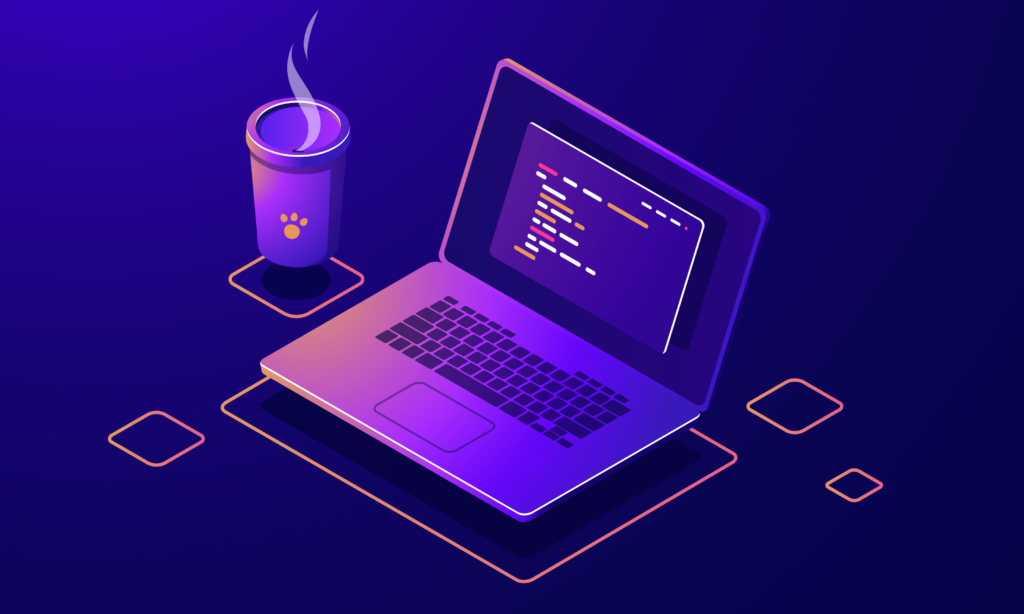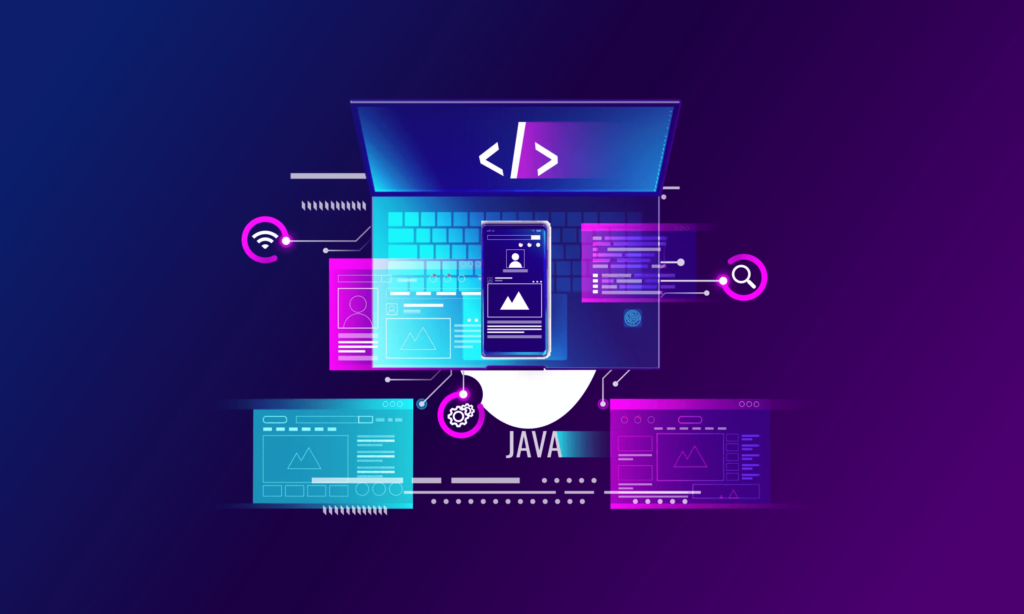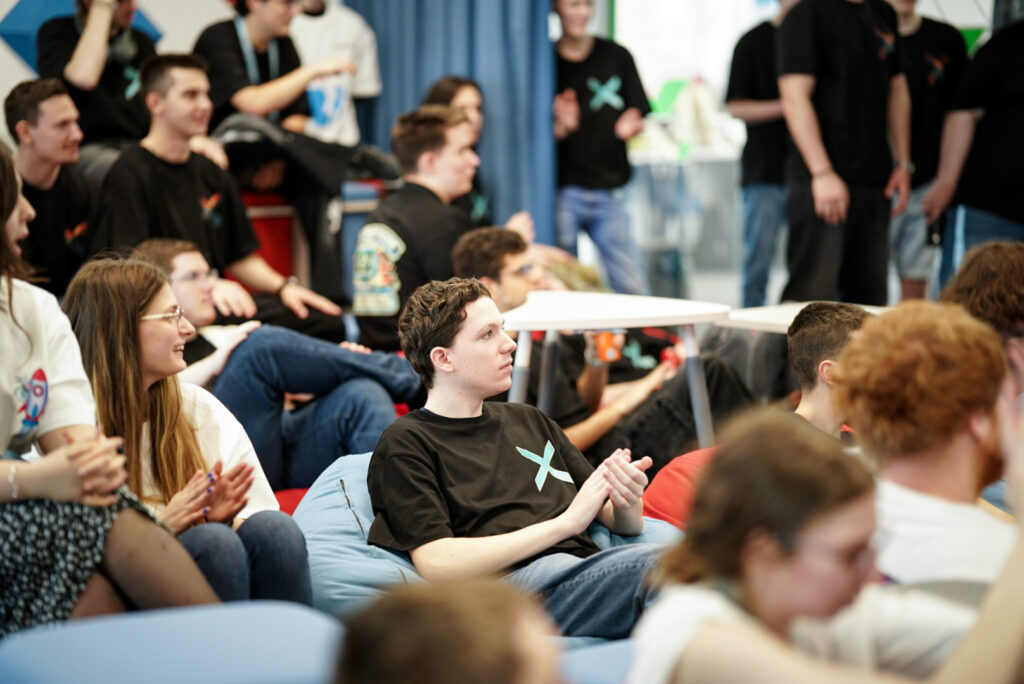Our experts have been involved in programming and directly recruiting and training Java specialists at NIX for more than 20 years. During this time they have conducted hundreds, even thousands of Java developer interviews. So today we want to give you some tips on how to successfully pass an interview for a Java Developer position.
Whether you are a novice developer, an experienced professional, or someone looking to transition into IT – all this information will be valuable to you. The number of Java vacancies continues to grow, making this an excellent time to prepare for a career path at NIX.

Why Java is an Ideal Starting Point
First and foremost, Java is more than just a programming language. It’s a technology and platform for developing complex applications without limitations.
With Java, you can create applications for embedded systems, mobile devices, and desktops, but the vast majority are large enterprise-level distributed systems. This widespread adoption stems from the language’s maturity, extensive open-source libraries, comprehensive frameworks, robust development tools, and a massive community. Most enterprise systems are either entirely written in Java or utilize Java-based components. New projects are also likely to incorporate Java, ensuring that demand for Java developers will continue to grow for years to come.
Additionally, Java constantly evolves. The syntax introduces constructs that streamline code writing, while adding mechanisms that enhance application speed and security. The Java development community regularly creates new frameworks and libraries, adapting modern approaches to application design.
Technical Requirements for Java Developer Interview
The nature of large distributed applications sets a rather high entry threshold. To succeed in even basic Java developer interview tasks, you need a solid understanding of computer science fundamentals, including:
- Data structures
- Algorithms
- System principles, computer architecture, and data storage
- Computing theory
- Data storage and processing
- Databases
- Software development technologies
Furthermore, knowledge of mathematical disciplines like combinatorics and probability theory is important. Technical universities typically cover these topics in their core curricula. However, if your education is non-technical or even humanities-based, the path to IT isn’t closed to you. Taking an IT Basics Course can provide the foundational knowledge needed to begin your journey. Determination, persistence, and diligence will help you acquire sufficient knowledge.
Over the years, we’ve encountered many professionals with non-technical backgrounds who have built successful careers as programmers. A developer’s career is a continuous learning journey — if you stop learning, your professional growth will stagnate.
Tips for Those Considering a Career in IT
To start preparing for a Java developer interview, you’ll need computer science knowledge and an understanding of Java, which will help you master many computer science concepts (including data structures and algorithms).
You can acquire this knowledge through various channels: books, YouTube tutorials, and online or offline courses. Each approach differs in effectiveness depending on your learning style.
We recommend starting with widely available resources. When selecting books or YouTube videos, remember that English proficiency is crucial. English is as important for your career as programming skills. Most technical documentation, training materials, and online courses are in English. Moreover, project requirements you’ll eventually work with will likely be in English as well. Consider learning English even before diving into programming languages.
Another effective approach is finding an IT company that offers training programs followed by internships or job opportunities. This guarantees quality instruction from experienced developers who are preparing you for their company’s needs. It might also simplify the hiring process, as you may bypass the formal Java developer interview if you complete the training successfully.
The NIX team offers a free Java Course specifically designed for aspiring developers who lack foundational knowledge. This structured approach can significantly accelerate your preparation for Java vacancies in the market.
After acquiring these basics, you can proceed to the next stage.
Tips for People Who Want to Become a Java Developer
As mentioned earlier, the entry barrier for developing large Java systems is quite high. Even simple tasks may require familiarity with multiple technologies, frameworks, and libraries. This technological stack can vary dramatically between projects. With this in mind, companies hiring inexperienced developers typically provide additional training to prepare them for current projects.
Don’t hesitate to apply for entry-level positions, even without extensive experience. However, your fundamental knowledge must be solid before any Java developer interview.
Writing an Effective Java Developer Resume
Having a well-crafted resume is often necessary when searching for a job. While many companies allow you to complete online questionnaires with minimal information, creating your own CV is beneficial. This document allows you to highlight your strengths and differentiate yourself from other candidates.
Considering your likely lack of experience at this stage, emphasize non-technical skills during the Java developer interview process.
Some key soft skills to highlight:
- Self-learning ability
- Teamwork experience
- Independence
- Friendliness
- Resilience in difficult situations
- Communication skills
- Diligence
- Responsibility
Describe all your positive traits in your CV, focusing on these areas. Fluency in English and proficiency in other foreign languages are also important points to mention.
If you have work samples in a GitHub repository, be sure to include a link to it in your resume. This serves two purposes:
- It demonstrates your familiarity with version control systems.
- It showcases your code quality and provides evidence of your programming experience.
Therefore, maintaining your code in a public repository during your training is always beneficial.
Although, don’t forget to include information about your educational background, whether it’s a university degree or ongoing studies. Additionally, mention any online courses, bootcamps, or IT schools where you gained technical knowledge. Note: If you list four different courses covering programming fundamentals but can’t answer basic questions during your Java developer interview, technical experts may question your learning ability.
By incorporating these tips, you can create a compelling resume that showcases your strengths and demonstrates your commitment to professional growth.
What to Expect in a Java Developer Interview
After submitting your resume or online questionnaire, you may be invited for an interview. However, with high application volumes, companies often conduct preliminary technical testing to screen candidates before interviews.
The NIX test includes straightforward questions about Java fundamentals and object-oriented programming. We also assess English proficiency. Candidates who pass both tests receive interview invitations.
Be prepared to discuss everything mentioned in your resume during the interview. Without practical experience, technical questioning will likely begin immediately.
In our opinion, a Junior Java Developer candidate should demonstrate:
- Cear understanding of object-oriented programming principles.
- Knowledge of core JDK libraries, such as collections, I/O, and multithreading.
We also evaluate understanding of Internet concepts and basic computer science principles. Additional advantages include database interaction skills, familiarity with fundamental frameworks (Spring, Hibernate), and experience with build tools (Maven, Gradle). The interviewer’s goal is to assess your knowledge depth in specific areas, so initial answers typically lead to follow-up questions. Even if you provide incorrect answers, we ask guiding questions to understand your thought process and reasoning abilities.
Many Java developer interviews require candidates to complete coding tasks. Since interviews can be stressful and affect cognitive performance, we prefer calm discussions, sometimes with humor. We’ll evaluate your coding skills later during team internships.
Interview outcomes are influenced equally by technical answer accuracy and overall communication impression. We assess how well you’ll integrate with our team. Sometimes candidates with imperfect technical answers but positive personal impressions receive second interview opportunities after improving their knowledge.
After technical questioning, you can ask about cooperation terms, potential projects, and career prospects. If you’re unsuccessful in your Java developer interview, don’t be discouraged. Use it as an opportunity to identify knowledge gaps and improve.
Remember: Technical proficiency isn’t the only hiring criterion. Team fit is equally important.
If you don’t match a particular team’s culture (which you likely won’t be told explicitly), it simply means that’s not your team. Your ideal team is still out there.
Tips for Experienced Java Developers
The recruitment process for experienced developers differs from that for beginners. We focus on work history, responsibilities, and project involvement. While specific technology knowledge matters, it’s not decisive, as each new project introduces different technologies and frameworks.
Experienced Java developers are expected to quickly master unfamiliar tools needed for their tasks.
What Java Interview Questions to Expect?
During interviews with experienced developers, we begin with fundamental questions about core Java and major frameworks. We once had a candidate who immediately refused to answer “simple questions.” This behavior seemed unprofessional since this was our first interaction. We needed to verify certain knowledge, but the candidate refused to demonstrate it. We concluded the interview immediately — our shortest interview ever.
If responses to basic questions show understanding, we discuss projects from the resume. There are no strict rules for this part of the Java developer interview.
We’re interested in problem-solving approaches. For example, we might describe a problematic situation and ask for potential causes. This reveals the depth of experience and decision-making abilities under information constraints.
Throughout the conversation, we assess team compatibility. Experienced developers are typically recruited for specific projects and positions with defined knowledge requirements and responsibility levels.
The most important advice for experienced developers preparing for a Java developer interview is thorough preparation. While obvious, this means being ready to answer any technical question related to your claimed experience. Avoid improvising. Experienced Java developers should understand their tools more deeply than specific tasks require.
When interviewing with a particular company, research their projects, products, and clients. This knowledge will influence the questions you receive.
Conclusion
Now is an excellent time to build a career in IT, particularly in Java development. The market is growing, specialists are in demand, and learning resources are abundant. These factors provide excellent career advancement prospects. Be courageous! We wish you successful interviews at NIX, rewarding projects, and supportive teams.
Topics and Materials for Junior Java Developer Interview Preparation
To build a solid foundation in Java programming, beginners should study:
Object-oriented programming:
- Polymorphism
- OOP Principles
Java Basics:
- Java (JDK, JVM, JRE, compiler)
- Data Types
- The primitives
- Type conversion
- Logic / Math operations
- Reference Types
- Arrays
- String handling
- Conditional statements
- Cycles
- Exceptions
- Classes, Objects, Interfaces
- Collections
- What’s new in Java 8?
- Input/Output
- Multithreading
- Working with Database, JDBC
- Servlet API
Java frameworks, libraries and tools:
- Maven
- Git
- Hibernate
- Apache Commons
- Apache Tomcat
Spring:
- Web
- Data
- Security
- Boot
Databases:
- MySQL
- PostgreSQL
- MongoDB
- H2
Customer environment:
1. HTML
2. CSS:
- Cascading Style Sheets, level 1
- Cascading Style Sheets Level 2 Revision 1
- CSS Snapshot 2018
3. JavaScript
- Modern JavaScript Tutorial
- The Progressive JavaScript Framework
- jQuery
Books:
- J. Glenn Brookshire, Denis Brilov “Computer Science. A Basic Course, 13th Edition”
- Kay Horstmann, “Java. The Professional’s Library.”
- Bob Martin “Clean Code: Creation, Analysis, and Refactoring”.
- Joshua Bloch, Effective Java. 3rd Edition
- Vladston Ferrero Philo “A Theoretical Minimum in Computer Science”






